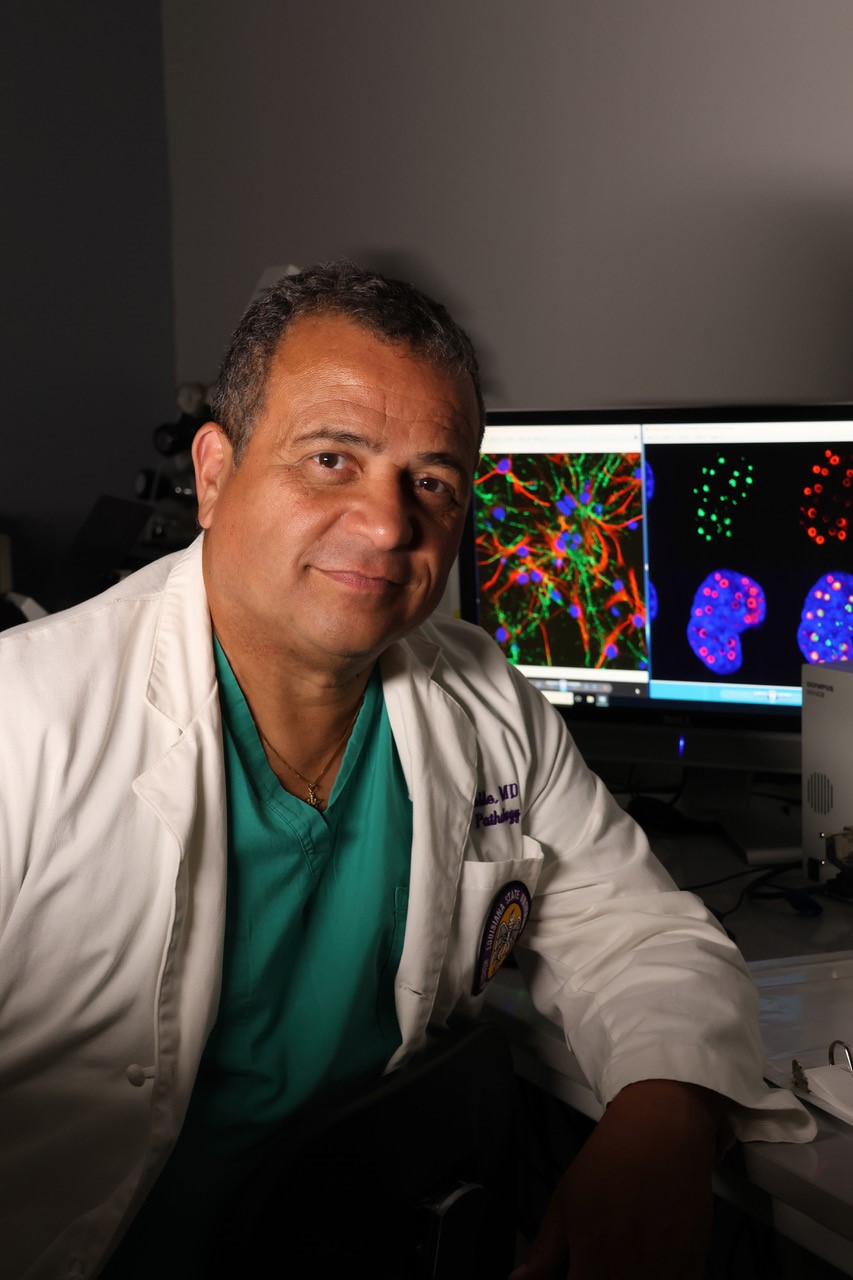Lab Profiles: Dr. Luis Del Valle’s Research on JC Polyomavirus and Brain Tumors
August 21, 2023
How Blood Samples Are Changing Cancer Research: Dr. Jiri Adamec’s Research on Blood Sampling
Cancer Research in Minority Populations With Dr. Jovanny Zabaleta
Kaposi Sarcoma Research at LSU LCMC Health Cancer Center With Dr. Charles Wood and Dr. John West
The Center for Translational Viral Oncology (CTVO) at LSU LCMC Health Cancer Center

Dr. Luis Del Valle, board-certified Pathologist with fellowships in Neuropathology from Thomas Jefferson University and Neurovirology from Temple University, has dedicated his entire career to cancer research. He has been continuously funded by the National Institutes of Health (NIH) for more than 23 years and has published over 175 peer-reviewed manuscripts in high-impact factor journals.
As a faculty member at LSU, he has taken on two separate — yet equally important — roles at the LSU/LCMC Health Cancer Center.
In one role, he is the Director of the Molecular Histopathology & Analytical Microscopy (MHAM) Core. For more than 10 years, he has worked with other researchers to test their hypotheses about cancer. He confirms their data using patient tissue samples with the latest molecular pathology techniques and state-of-the-art microscopes, helping determine whether or not their findings will translate to helping patients. This research directly impacts cancer prevention, novel treatment, and care.
Research in the MHAM Core has led to groundbreaking findings in many areas, including leukemias, lymphomas, gastric cancers, neuroendocrine tumors, brain tumors, including glioblastomas, lung cancer, colon cancer, HPV and cervical cancer, prostate cancer, triple-negative breast cancer, and even COVID-19.
But Dr. Del Valle’s work doesn’t stop there. As the Principal Investigator in his lab, he’s also conducting his own research and has been for over 24 years. This research is aimed to understand the role of the human Polyomavirus JCPyV in the pathogenesis of brain tumors and gastrointestinal cancers.
What is JC Polyomavirus?
Viruses are everywhere. In fact, there are more of them than there are stars in the universe. Some of them simply coexist with humans, and some of them are even helpful. Other viruses can have detrimental effects on the human body, and several of them have been linked to cancer.
JCPyV — a member of the Polyomavirus family — is a human virus that infects the vast majority of people worldwide. According to several epidemiological studies, up to 85 to 90% of people are infected with JCPyV.
After primary infection, the virus remains dormant (or inactive) in the kidney. However, under immunosuppressive conditions, including in those who have a weakened immune system, it can reactivate and mutate (or change).
This can lead to a fatal disease called Progressive Multifocal Leukoencephalopathy (PML). PML is a demyelinating disease, which means it causes damage to the myelin sheath — the protective covering that surrounds the nerve fibers in your brain, the optic nerves (the nerves leading to your eyes), and the spinal cord.
When the myelin sheath is damaged, nerve impulses slow or even stop, causing neurological problems. This is prevalent in patients with AIDS, and within the last decade, it has been seen in patients undergoing immunotherapy treatment.
The most significant discovery in Dr. Del Valle’s lab regarding PML is the reactivation of a normally dormant protein called Survivin. Survivin is an anti-apoptotic protein — which means it stops apoptosis, a process that gets rid of damaged cells, including virally infected ones — and plays a role in preventing cancer.
One of the proteins produced in the early stages of JCPyV infection, called Large T-Antigen, is capable of activating the gene responsible for Survivin. This data suggests that JCPyV can use this mechanism to prolong the life of infected cells in order to complete its replication cycle.
JC Virus and Cancer
PML was described for the first time in 1956, but its cause was unknown until 1965. This came about when JCPyV was discovered by two giants in the fields of virology, Gabriella Zu Rhein, and pathology, Arthur Rubinstein.
Early experiments designed to reproduce PML in animal models resulted, to everyone’s surprise, in the development of brain tumors after direct infection of the virus. This unexpected turn of events sparked a fascinating question about how the virus can cause one disease in humans (PML) and another in animals (cancer).
This question has been the heart of Dr. Del Valle’s research for the last two decades.
While with Temple University, Dr. Del Valle and his group discovered the presence of JC viral DNA sequences in and the expression of the oncogenic (tumor-causing) viral protein T-Antigen in a variety of brain tumors, including medulloblastomas, astrocytomas and glioblastomas, oligodendrogliomas, and CNS lymphomas.
Later it was found that JCPyV causes severe DNA damage in infected cells and prevents DNA repair by binding IRS-1, a protein that promotes cell growth, and bringing it to the nucleus of cells. There, it interferes with the normal DNA repair machinery of the cell.
Dr. Del Valle hypothesized that this mechanism — together with the activation of Survivin — allows infected glial cells (non-neuronal cells in the central nervous system, including the brain and spinal cord) the necessary time to mutate and become cancerous, contributing to the development of brain tumors.
Since then, Dr. Del Valle has also found connections with the JC virus and other cancers, including colon carcinomas.
Dr. Del Valle has been researching the JC virus for decades. He knows the intricacies of this virus better than most, and still, he finds pleasure in unexpected discoveries. Quoting former scientist and author Isaac Asimov, Dr. Del Valle says, “The most exciting phrase to hear in science, the one that heralds new discoveries, is not 'Eureka!' but 'That's funny...'’”
While Dr. Del Valle has had his share of “Eureka!” moments, it has been the more subtle findings that have led to the most significant advancements in science and cancer research, and for him, the most satisfaction in his career.
